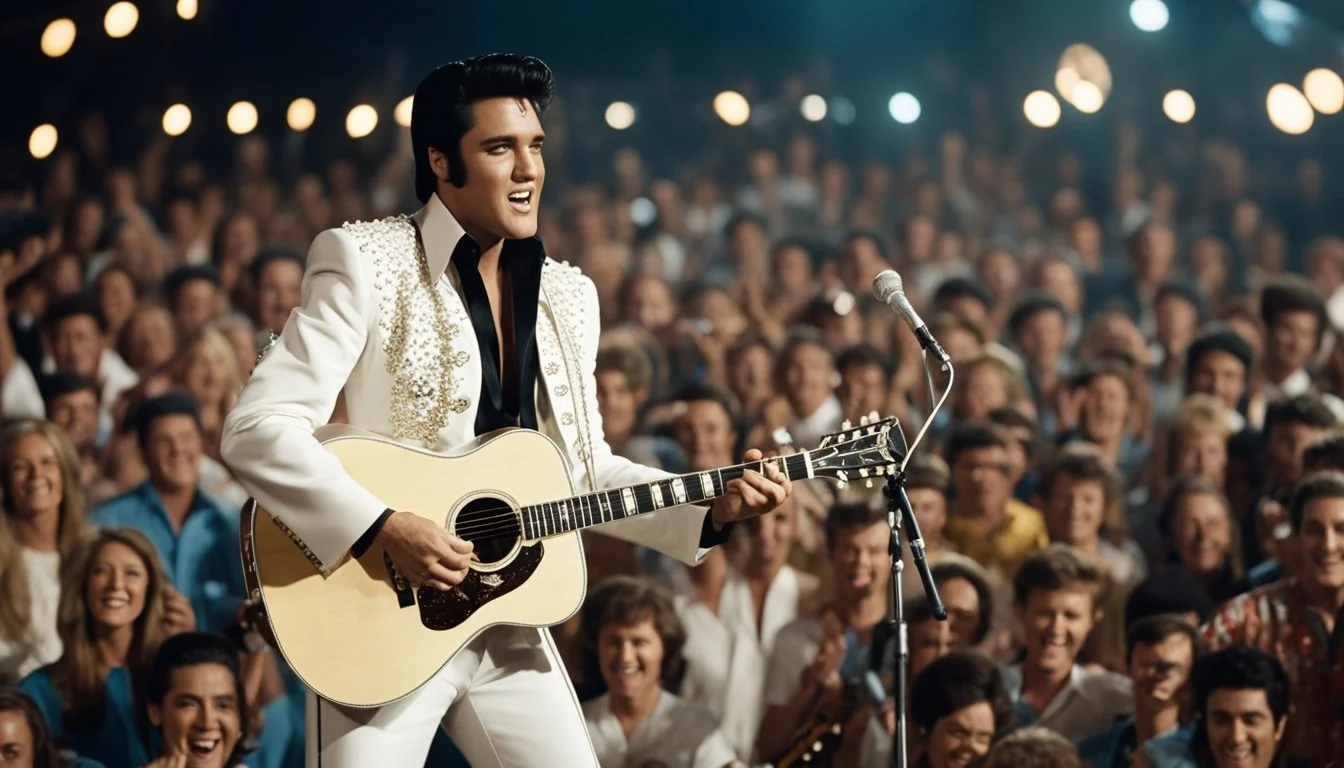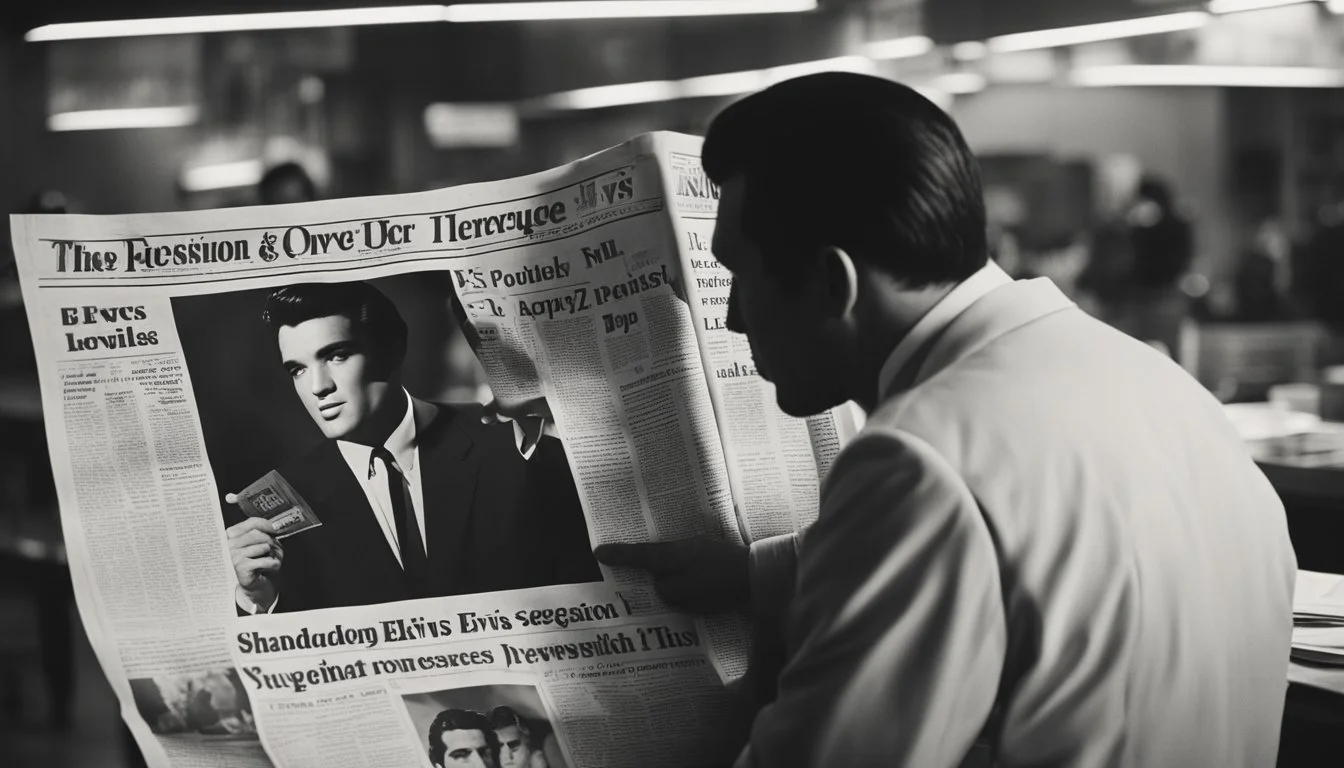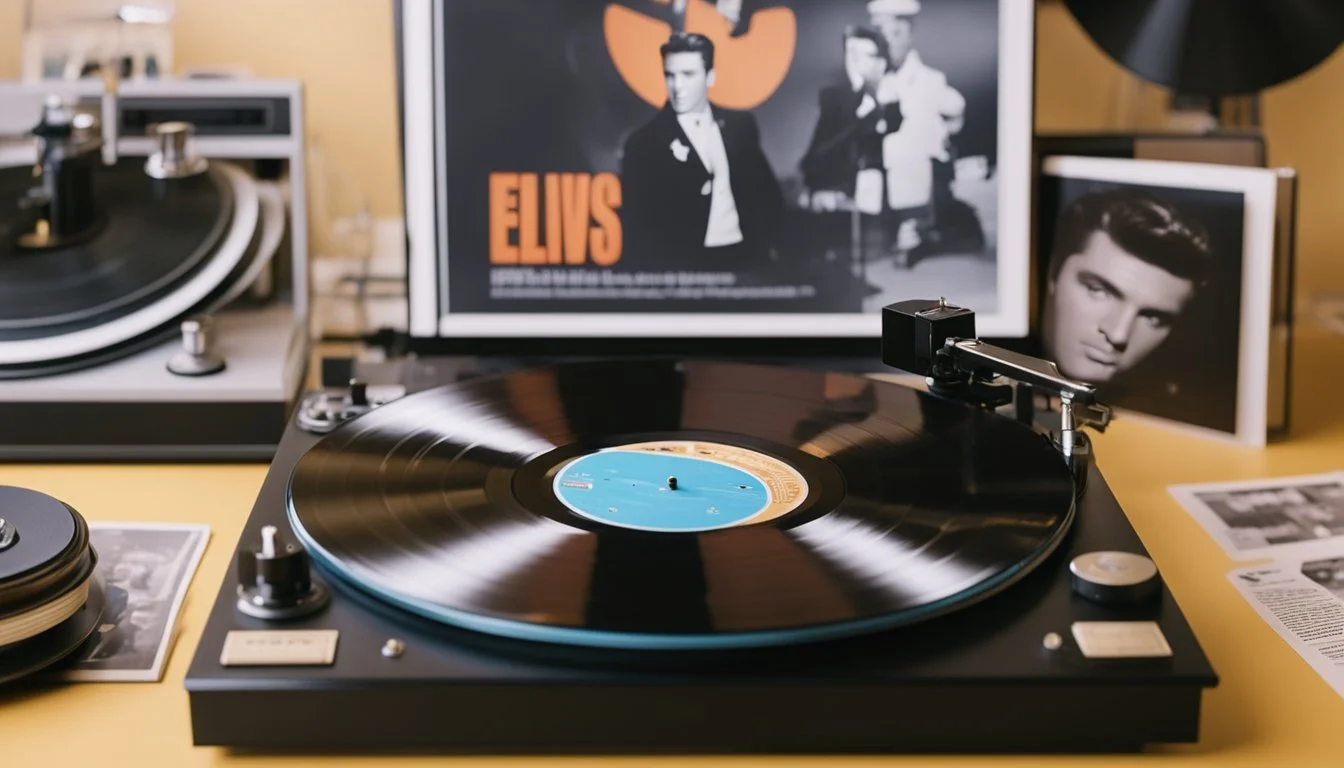Heartbreak Hotel or Hideout Haven? Unmasking the King's Alleged Afterlife
Elvis Presley's death on August 16, 1977, shocked the world. Yet decades later, some fans cling to the belief that the King of Rock and Roll faked his own demise.
Despite numerous conspiracy theories, there is no credible evidence that Elvis Presley is still alive. The singer's death was thoroughly documented and investigated by medical professionals and law enforcement.
Theories about Elvis's survival persist due to a combination of grief, denial, and the allure of a good mystery. Some claim he entered witness protection, while others insist on alleged sightings. These ideas, while creative, lack substantiation and ignore the well-established facts surrounding his passing.
Exploring the Legend of Elvis Presley
Elvis Presley's meteoric rise to fame and enduring cultural impact cemented his status as the "King of Rock and Roll." His unique blend of musical styles and charismatic performances revolutionized popular music and entertainment in the mid-20th century.
Early Life and Rise to Fame
Elvis Aaron Presley was born on January 8, 1935, in Tupelo, Mississippi. He grew up in a modest household and developed a passion for music at a young age. In 1954, Elvis recorded his first single, "That's All Right," at Sun Records in Memphis, Tennessee. This marked the beginning of his rapid ascent to stardom.
His distinctive voice, energetic stage presence, and fusion of country, R&B, and gospel styles quickly captivated audiences. Elvis's early hits like "Heartbreak Hotel" and "Hound Dog" propelled him to national fame. By 1956, he had become a household name, appearing on popular television shows and starring in his first film, "Love Me Tender."
Military Service and Acting Career
In 1958, at the height of his popularity, Elvis was drafted into the U.S. Army. He served for two years, including a stint in Germany. Despite concerns about the impact on his career, Elvis's time in the military only enhanced his public image.
Upon returning to civilian life in 1960, Elvis resumed his music and film career with renewed vigor. He starred in numerous movies throughout the 1960s, including "Blue Hawaii" and "Viva Las Vegas." While these films were commercially successful, they received mixed critical reception.
The Las Vegas Residency and Decline
In 1969, Elvis began a series of concerts at the International Hotel in Las Vegas. These performances marked a significant comeback for the singer, showcasing his enduring talent and appeal. His jumpsuit-clad stage persona became iconic during this period.
However, the demanding schedule and lifestyle took a toll on Elvis's health. He struggled with prescription drug dependency and weight gain. Despite these challenges, he continued to tour and perform throughout the early 1970s.
Elvis's final years were marked by declining health and erratic behavior. On August 16, 1977, he suffered a fatal heart attack at his Graceland mansion in Memphis, Tennessee. He was 42 years old. Elvis's untimely death shocked the world and solidified his legendary status in music history.
The Death of a Superstar
Elvis Presley's death on August 16, 1977 shocked the world and marked the end of an era in music history. The sudden loss of the King of Rock and Roll at age 42 left an indelible impact on popular culture.
Announcement and Public Reaction
Elvis was found unresponsive on his bathroom floor at Graceland. His personal physician pronounced him dead at 3:30 PM. The news spread rapidly, stunning fans worldwide.
Memphis was flooded with mourners. Radio stations played Elvis songs non-stop. President Carter praised Elvis as a "symbol of America's vitality, rebelliousness, and good humor."
Many fans refused to believe Elvis had died. Sightings were reported for years after. Some claimed the death certificate was fake or that Elvis entered witness protection.
Funeral and Memorials
Elvis's funeral was held on August 18, 1977 at Graceland. Over 80,000 people lined the processional route to Forest Hill Cemetery.
The casket was placed in the foyer of Graceland for public viewing. An estimated 30,000 fans passed by to pay respects.
Elvis was initially buried next to his mother at Forest Hill. Security concerns led to both being moved to Graceland's Meditation Garden. The grave became a permanent memorial and pilgrimage site for fans.
Impact on Music and Pop Culture
Elvis's death cemented his legendary status. Album sales skyrocketed. Graceland became a major tourist attraction, drawing over 600,000 visitors annually.
Elvis impersonators multiplied, keeping his image and music alive. Films, books and conspiracy theories about his death emerged.
His influence lived on in countless musicians. "Heartbreak Hotel" and other hits remained pop culture touchstones. Elvis posthumously entered the Rock and Roll, Country Music, and Gospel Music Halls of Fame.
Annual memorial events at Graceland, including candlelight vigils, continue to draw thousands of devoted fans decades after his passing.
Conspiracy Theories and Speculations
Elvis Presley's death sparked numerous conspiracy theories and speculations. Devoted fans have claimed sightings of the King long after his reported passing, while others believe he orchestrated an elaborate scheme to fake his own death.
Alleged Sightings of Elvis
Some fans insist they've spotted Elvis in various locations years after his death. Notable alleged sightings include:
A bearded man in the background of a scene from the 1990 film "Home Alone"
Kalamazoo, Michigan, where Elvis was supposedly working as a groundskeeper
Buenos Aires, Argentina, where he was rumored to be living under an assumed name
The Elvis Sighting Society has documented many of these claims. However, no credible evidence supports these sightings.
Theories of Faking His Own Death
Several theories suggest Elvis faked his death for various reasons:
To escape the pressures of fame
To enter witness protection due to mafia connections
As part of an undercover FBI operation
Some believe Elvis assumed the identity of his stillborn twin, Jesse Garon Presley. Supporters of these theories point to alleged inconsistencies in official reports and supposed FBI documents.
A book by Gail Brewer-Giorgio popularized the idea that Elvis became an undercover agent for the FBI in 1976 to infiltrate a criminal organization called "The Fraternity."
Despite the persistence of these theories, no concrete evidence has ever emerged to support claims that Elvis Presley is still alive.
Cultural and Biographical Examinations
Elvis Presley's life and legacy have been extensively explored through various forms of media. These works provide insights into the cultural impact and biographical details of the iconic musician.
Biopics and Documentary Films
Baz Luhrmann's 2022 biopic "Elvis" starred Austin Butler as the titular character and Tom Hanks as Col. Tom Parker. The film blended fact and fiction to portray Elvis's rise to fame and complex relationship with his manager. It featured notable scenes, including a performance of "Trouble," though this was historically inaccurate for the depicted time period.
Documentaries have also examined Elvis's life. These films often focus on specific aspects of his career, such as his Las Vegas residencies or his time in the Army. Many explore the cultural impact of hits like "Jailhouse Rock" and "Viva Las Vegas."
Literature and Investigative Reports
Alanna Nash's book "The Colonel: The Extraordinary Story of Colonel Tom Parker and Elvis Presley" delves into the controversial figure behind Elvis's career. It examines Parker's influence on Elvis's decisions and legacy.
Peter Guralnick's two-volume biography provides a comprehensive look at Elvis's life and artistry. His work is considered one of the most thorough examinations of the singer's career.
Gail Brewer-Giorgio's "Is Elvis Alive?" sparked conspiracy theories about Elvis faking his death. While widely dismissed, it demonstrates the enduring public fascination with the King of Rock and Roll.
The Elvis Presley Legacy
Elvis Presley's impact on music and popular culture continues decades after his death. His influence extends far beyond his music, shaping art, fashion, and entertainment.
Continued Influence on Music and Art
Elvis Presley's musical legacy remains strong in the 21st century. His distinctive vocal style and energetic performances continue to inspire contemporary artists across genres.
Many musicians cite Elvis as a major influence, incorporating elements of his sound into their work. His fusion of rock, country, and blues helped create the foundation for modern popular music.
Elvis's impact on visual art is equally significant. His iconic image appears in countless paintings, sculptures, and multimedia works. Artists frequently reference his style and persona in their creations.
Preservation of Graceland and Memorials
Graceland, Elvis's former home in Memphis, Tennessee, stands as a testament to his enduring legacy. The mansion attracts over 500,000 visitors annually, offering fans a glimpse into the King's private life.
The estate meticulously preserves Elvis's personal belongings and memorabilia. Guided tours showcase his lavish lifestyle and musical achievements.
Numerous memorials and museums dedicated to Elvis exist worldwide. These sites celebrate his contributions to music and culture. The Elvis Presley Birthplace in Tupelo, Mississippi, and the Elvis-A-Rama Museum in Las Vegas are popular destinations for fans.
Annual events like Elvis Week in Memphis keep his memory alive. These gatherings feature concerts, panel discussions, and Elvis impersonator contests.
Exploring Fan Devotion
Elvis Presley's enduring popularity has inspired intense fan devotion spanning decades. His loyal followers have created vibrant communities and artistic tributes to keep the King's legacy alive.
Fan Clubs and Tributes
Elvis fan clubs flourish worldwide, connecting enthusiasts through shared admiration. These groups organize events, maintain archives, and support charitable causes in Elvis's name.
Graceland, Elvis's former home, hosts annual gatherings drawing thousands. Fans participate in candlelight vigils, concerts, and panel discussions.
Priscilla Presley plays a key role in preserving Elvis's memory. She oversees Graceland operations and participates in fan events.
Elvis tribute concerts feature both professional performers and amateur enthusiasts. These shows recreate iconic moments like the '68 Comeback Special and Christmas broadcasts.
Elvis Impersonators and Their Role
Elvis impersonators, often called tribute artists, keep the King's image and music alive. These performers range from casual enthusiasts to full-time professionals.
Many impersonators adopt specific eras of Elvis's career, such as the 1950s rockabilly look or the 1970s jumpsuit style.
Impersonators perform at weddings, corporate events, and dedicated Elvis festivals. Some achieve fame in their own right, appearing on television shows and in films.
Las Vegas hosts numerous Elvis-themed shows, carrying on the tradition of his residencies there. These productions combine music, costumes, and choreography to recreate the Elvis concert experience.






